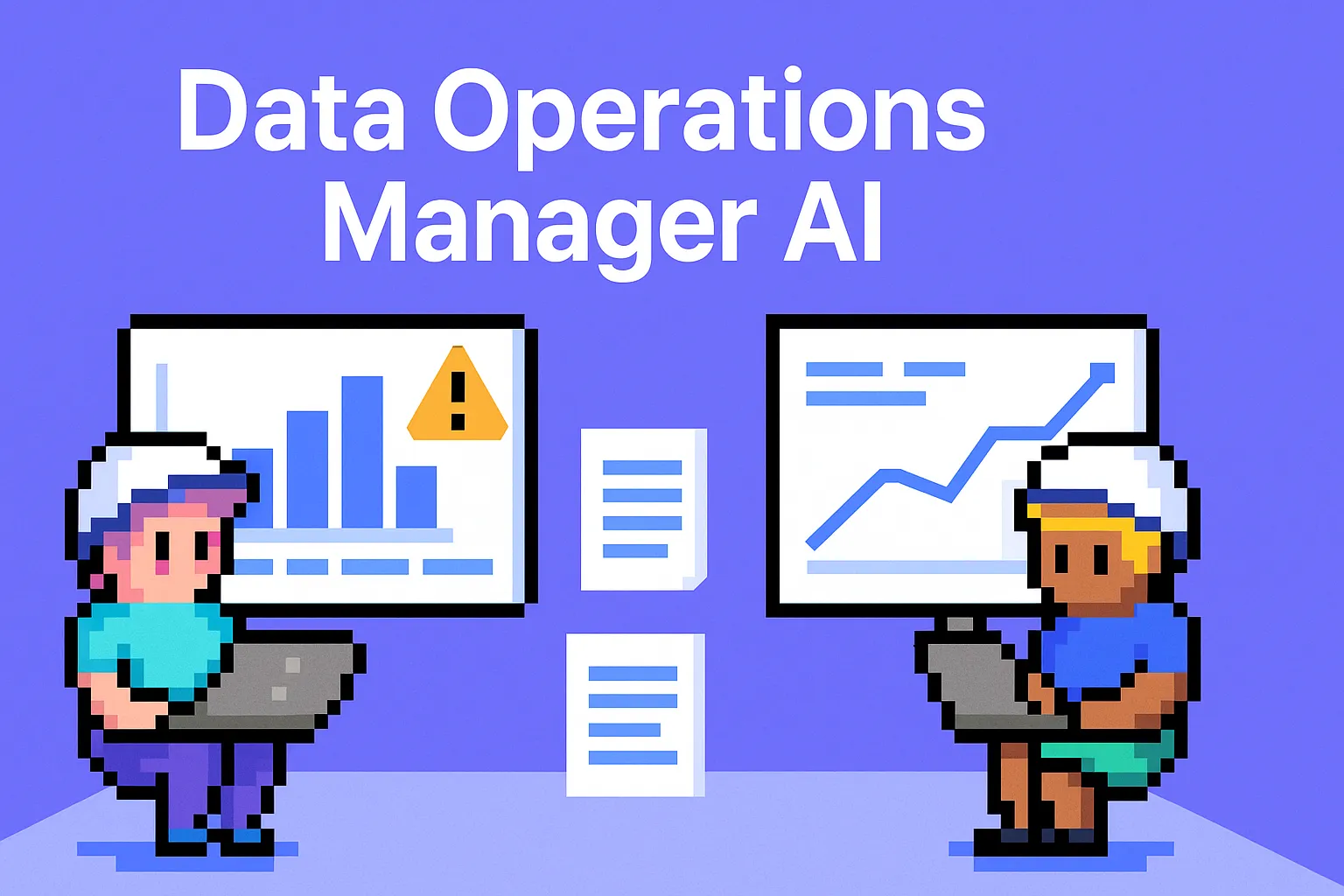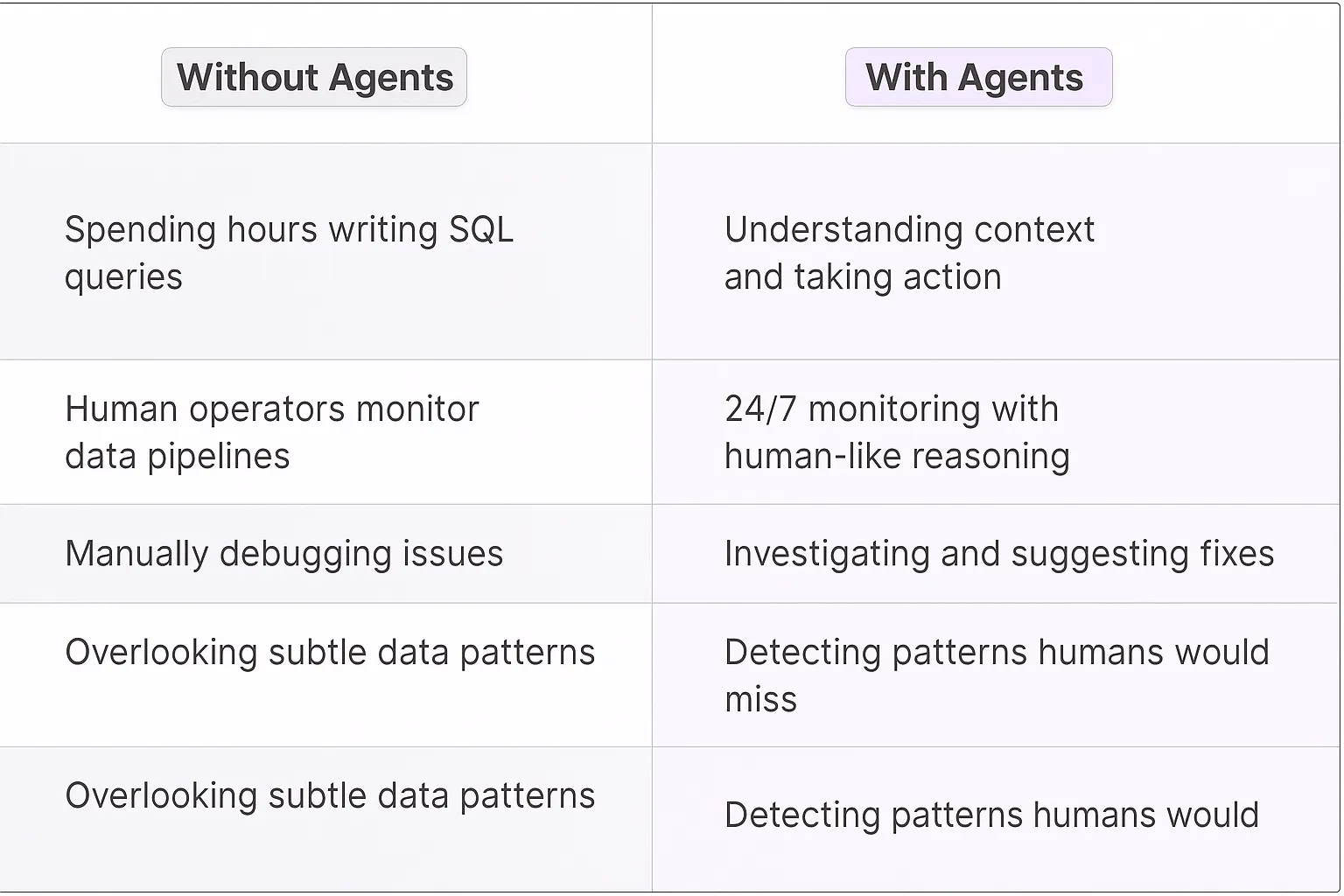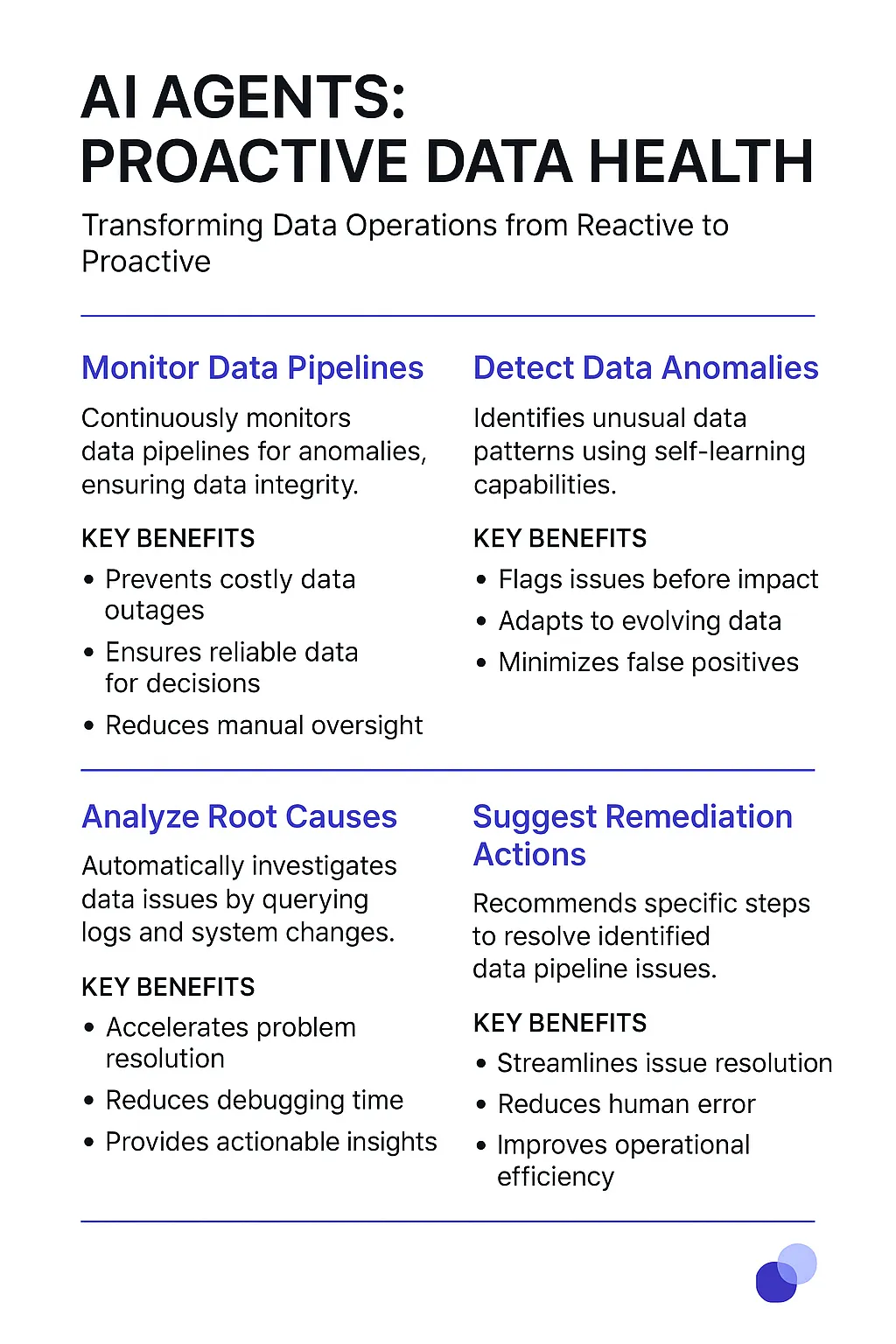Data Operations Manager represents a new breed of AI-powered technology that acts as a digital teammate in managing complex data infrastructures. Unlike traditional tools that simply automate tasks, it brings cognitive capabilities to understand context, learn from patterns, and make intelligent decisions about data operations. The system continuously monitors data pipelines, maintains documentation, and proactively identifies potential issues before they impact business operations.

Traditional data ops relied heavily on human operators juggling multiple tools and manual processes. Teams would spend countless hours writing SQL queries, debugging ETL pipelines, and monitoring data quality through spreadsheets and basic dashboards. The cognitive load was intense - engineers had to context switch between different systems while maintaining complex mental models of their data architecture.
Most organizations cobbled together a mix of cron jobs, basic automation scripts, and alert systems that generated more noise than signal. The result? Engineers spent more time firefighting issues than building valuable data products.
Digital teammates fundamentally transform how we handle data operations through their ability to understand context and take intelligent action. They operate as an extension of your data team, bringing 24/7 monitoring with human-like reasoning.
These AI agents detect subtle patterns in your data pipelines that would take humans days or weeks to uncover. When anomalies emerge, they don't just flag issues - they investigate root causes, suggest fixes, and can even implement solutions with proper approval workflows.
The network effects are particularly powerful. Each interaction makes the AI more attuned to your specific data environment. They learn which issues matter most, how your team prefers to handle different scenarios, and the nuances of your data architecture.
Beyond monitoring, these digital teammates excel at data documentation and knowledge management. They maintain living documentation of your data assets, capture tribal knowledge, and make this information accessible through natural language interactions. This dramatically reduces the time new team members spend getting up to speed.
The most compelling benefit is how AI agents enable data teams to shift from reactive to proactive operations. Instead of constantly putting out fires, teams can focus on strategic initiatives that drive business value. The AI handles the routine while surfacing insights that help prevent future issues.

When we look at how AI agents transform data operations, we're seeing a fascinating network effect play out. Each interaction between the AI and your data infrastructure creates a compound learning effect that makes the entire system more intelligent.
The most interesting pattern I'm seeing is how these digital teammates are shifting from reactive to predictive operations. They're not just fixing problems - they're anticipating them 2-3 steps ahead. This creates a powerful feedback loop where your data operations become increasingly resilient over time.
What's particularly compelling is the emergence of collaborative intelligence between human operators and AI agents. The AI handles the heavy lifting of monitoring and routine optimizations, while human operators focus on strategic decisions and edge cases. This division of labor is creating a new operational paradigm that's fundamentally more scalable than traditional approaches.
The growth loops here are clear: As AI agents process more operational patterns, they become better at prediction and optimization, which leads to better data quality and system performance, which in turn generates more high-quality operational data for learning. It's a classic positive feedback loop that compounds over time.

The versatility of AI agents in Data Operations Management creates transformative opportunities across multiple sectors. Data Ops teams face increasingly complex challenges - from maintaining data quality at scale to orchestrating cross-functional workflows. AI agents are becoming essential partners in navigating these challenges.
When I advise startups building data infrastructure, I emphasize how AI agents fundamentally shift the dynamics of data operations. Rather than just automating repetitive tasks, these digital teammates augment human capabilities in sophisticated ways. They can detect anomalies before they become problems, suggest optimization strategies based on historical patterns, and maintain consistency across disparate data systems.
The real power emerges when AI agents handle the heavy lifting of data monitoring, validation, and basic troubleshooting. This frees up Data Ops teams to focus on strategic initiatives like architectural improvements and cross-team collaboration. The result? Faster deployment cycles, improved data quality, and more resilient data infrastructure.
Looking at specific industries, we're seeing AI agents tackle unique data operations challenges - from managing real-time financial data streams in fintech to orchestrating clinical trial data in healthcare. These use cases demonstrate how AI agents adapt to distinct regulatory requirements and operational constraints while delivering consistent value.
A major healthcare network managing 12 hospitals and 200+ clinics faced a classic data nightmare - siloed systems, inconsistent formats, and manual reconciliation eating up 40% of their data team's time. The introduction of a Data Operations Manager AI agent transformed their entire data ecosystem.
The digital teammate took over the heavy lifting of data validation, standardization, and integration across their Epic EMR system, billing platforms, and research databases. It continuously monitors data quality, flags anomalies, and maintains audit trails - tasks that previously required 3 full-time analysts working in shifts.
What's fascinating is how the AI agent learned the network's specific data patterns and compliance requirements. When a new clinic joined the network with different formatting conventions, the agent automatically mapped their data structure to the standardized format while preserving critical patient information relationships.
The most impactful outcome wasn't just the 70% reduction in data processing time - it was the ripple effect on patient care. Clinicians now access unified patient histories in seconds instead of hours. Research teams can query clean, standardized datasets without spending weeks on data preparation. The billing department's claim rejection rate dropped from 12% to 3% due to improved data accuracy.
This shift represents a fundamental evolution in healthcare data operations. The AI agent isn't just handling tasks - it's actively maintaining the integrity of the organization's data infrastructure, allowing human teams to focus on strategic initiatives like predictive analytics for patient outcomes and resource optimization.
A global investment bank's data operations were drowning in complexity - managing market data feeds, risk analytics, and client portfolio information across 47 countries. Their legacy systems created a maze of data inconsistencies that made real-time decision-making nearly impossible.
The Data Operations Manager AI agent they deployed became the central nervous system of their data infrastructure. It handles the intricate dance of normalizing data from Bloomberg terminals, Reuters feeds, internal trading systems, and compliance databases. The fascinating part? The agent learned to identify subtle market anomalies that even experienced analysts missed.
One particularly clever aspect is how the AI agent manages real-time currency conversions and risk exposure calculations across different time zones. When the Asian markets open, it automatically adjusts data flows and reconciliation priorities, ensuring traders in London and New York have accurate positions before their trading days begin.
The results speak volumes: trade reconciliation errors dropped by 82%, and the time to generate regulatory reports decreased from 3 days to 4 hours. But the real game-changer was the AI's ability to create a unified view of client exposure across all asset classes - something the bank had tried and failed to achieve with traditional data warehousing approaches.
The bank's data scientists now spend their time building predictive models for market opportunities instead of cleaning data. Their compliance team can instantly trace any transaction's full lineage across systems. Most importantly, the bank can now launch new financial products in weeks instead of months because their data infrastructure actually works.
This transformation shows how AI agents aren't just solving technical problems - they're fundamentally changing how financial institutions operate. When your data operations run like clockwork, you can focus on what really matters: finding alpha and serving clients better.
Implementing a Data Operations Manager AI requires careful navigation of several technical complexities. Legacy systems often speak different languages - literally and figuratively. Your AI needs to understand and translate between SQL, NoSQL, and various data formats while maintaining data integrity. We've seen organizations struggle when their AI can't properly interpret schema changes or handle data type inconsistencies across different databases.
The AI's effectiveness hinges on its ability to maintain pristine data quality. Missing values, duplicates, and inconsistent formatting can cascade into major issues. The AI needs sophisticated validation rules and error handling capabilities. One Fortune 500 company learned this the hard way when their data ops AI began propagating corrupted data across systems because it lacked robust quality checks.
Data operations AI agents require broad system access, creating potential security vulnerabilities. You'll need to implement granular permission controls and audit trails. GDPR, CCPA, and industry-specific regulations add another layer of complexity - your AI must understand and enforce data handling policies while documenting compliance.
The human side of implementation often proves more challenging than the technical aspects. Data teams may resist what they perceive as automation of their core responsibilities. Success requires clear communication about how the AI augments rather than replaces human expertise. Creating feedback loops between the AI and human operators helps build trust and improves outcomes.
Tracking your AI's effectiveness requires sophisticated monitoring beyond basic uptime metrics. You need visibility into data quality scores, processing accuracy, and business impact metrics. Building these monitoring capabilities often requires significant investment in observability tools and dashboards.
Organizations frequently underestimate the computational and storage resources needed for effective data operations AI. Real-time data processing, especially at scale, demands substantial infrastructure. Planning for growth and peak loads while managing costs requires careful capacity planning and potentially hybrid cloud strategies.
The integration of AI agents into data operations marks a fundamental shift in how organizations manage their data infrastructure. The compound effects of AI learning and adaptation create an increasingly intelligent system that grows more valuable over time. Looking ahead, the organizations that thrive will be those that effectively partner with these digital teammates to create more resilient, efficient, and proactive data operations.
The most successful implementations I've seen treat AI agents not as mere tools but as integral members of their data teams. This mindset shift - from automation to augmentation - unlocks the true potential of AI in data operations. As these systems continue to evolve, they'll enable data teams to focus on strategic initiatives while maintaining unprecedented levels of operational excellence.